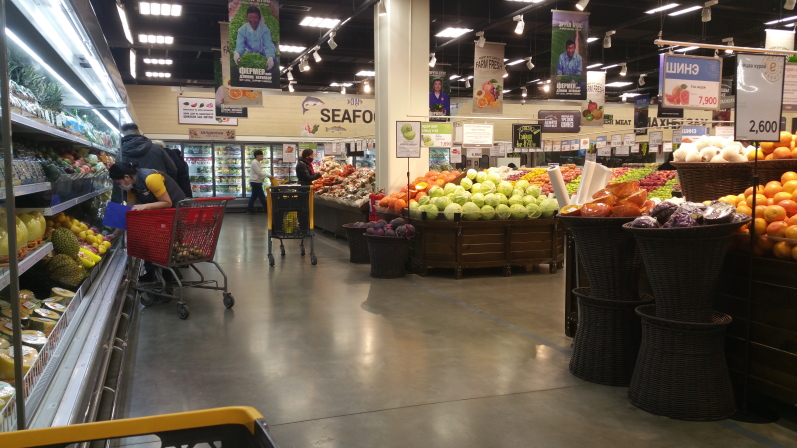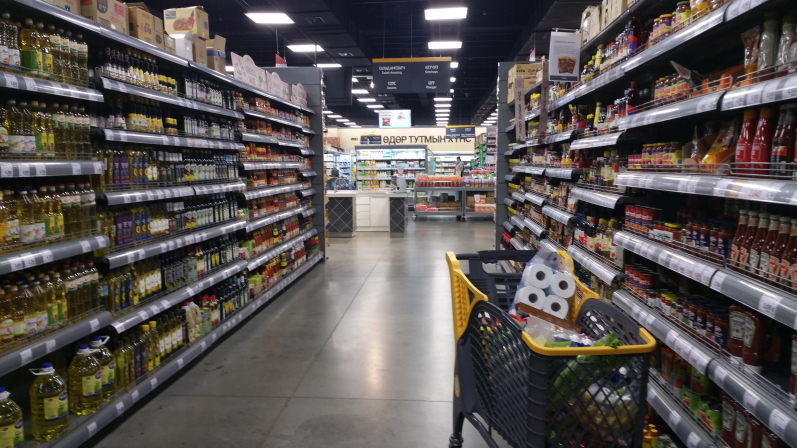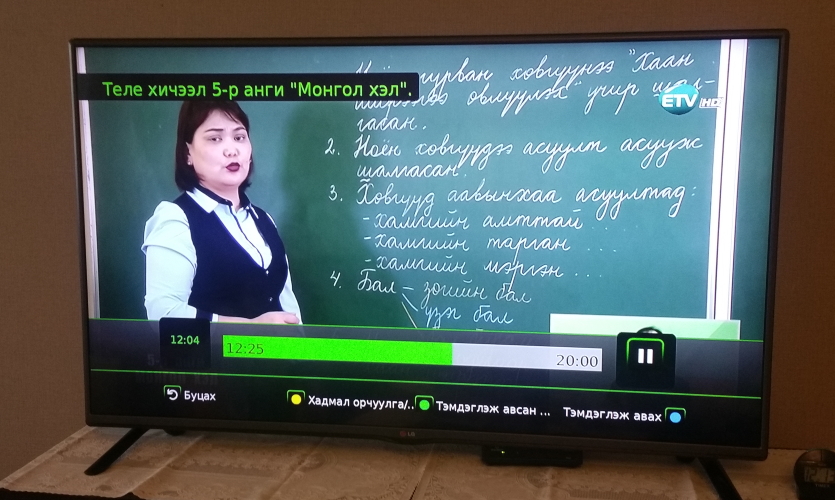COVID-19 Over the Mongolian Horizon: Observations and What Others Can Possibly Expect
So, it seems like those in the US and Europe are really waking up to the coronavirus pandemic, with panic buying starting to be seen at Costcos and certain items flying off the shelves. In the spirit of giving you folks a heads up of other things that might come (and hopefully allay some of the panic), here are some observations I’ve made in Mongolia where we’ve been 5 or 6 weeks ahead of most of you in this pandemic.
1) Panic buying
Buying panics have happened twice here in Ulaanbaatar. The first time was in late January before we arrived back, and apparently it got started when someone posted some empty shelves at a store on Facebook. A lot of people hit the stores and emptied the shelves, but the stores had almost everything restocked within a few days. The second time was a few weeks later when someone on Facebook claimed that a suspected case in Khuvsgul died and his family was in quarantine (the gov’t said it was ‘fake news’ and fined the poster… hard to say if it was gov’t coverup or not). Again, stores were back to normal within a couple days easy.


Our local E-mart grocery supermarket the week after the first panic buying event. Everything more or less normal.
To be fair every situation will be somewhat different, but I would expect most stores will be mostly restocked within a week of being hit by panic-buyers. Our experience was not that shelves are stripped bare (at least not for longer than a few days), but rather we simply end up with a handful of certain products that sell out and stay sold out like N95 & surgical masks, hand sanitizer, Clorox wipes, and Theraflu. But most of the basics… soap, canned & perishable foods, toilet paper can still be found anywhere. To be fair there might be certain items that aren’t impossible to find but tend to sell out quickly. Here liquid bleach has been one of those things. And while we haven’t seen it here, I heard that “runs” on toilet paper were big in Singapore… (sorry, couldn’t resist 
2) School closures
The schools and universities here have been closed for something like five weeks now, and instead they’re broadcasting classes for each grade level through the day. The ‘classes’ are less than an hour so it’s a poor substitute, but it’s something. We had been doing some homeschooling on the side with online resources and some workbooks for a few years now, and since the schools were closed we’ve been putting more emphasis on those lately.

My son’s televised class for the day.
I think it’s reasonable to expect some areas in North America and Europe will be closing their schools in response to the pandemic. So for you parents of school-age children, are you ready for that? If not, look into finding ways to ensure your kids have someone to watch them during the day and buy (or at least be ready to buy) some additional learning workbooks and such.
3) Business closures
With the school closures here came closures of other businesses that pose high risk of spreading infections. These include kindergartens & daycare centers, movie theaters, concerts & large public entertainment venues, and gyms & fitness centers. As you can imagine, businesses reliant on cross-border trade & tourism are effectively being shut down from border closures too. Restaurants are still open, but both restaurants and bars have been ordered to reduce their hours.
So now we’ve got a lot of people working in these areas that are either working less or temporarily out of a job… teachers, restaurant workers, fitness instructors, you name it. Those people are spending a lot less now, and that combined with everyone else going out of the house less is negatively impacting other businesses like restaurants, shops, street vendors, and taxi drivers. Hopefully your neck of the woods won’t see this level of impact, but it’s something you should be prepared for. If you work in these sectors or have a business reliant on them, prepare your cash reserves and make a plan now just in case.
4) Travel restrictions
The first travel restrictions we experienced were air and land traffic closures from China, and shortly afterwards it was expanded to Hong Kong and Taiwan. As cases spread in Japan, South Korea, and Italy we had restrictions on people traveling from those places as well. Interestingly Bangkok is in the list too despite the low ‘official’ number of cases in Thailand (obviously there is distrust in the official numbers). Recently the US State Department issued a travel advisory for Mongolia… not so much because of infection risk, but mostly because so many of the air & land travel routes in & out of Mongolia have been shut down. The only routes remaining are through Moscow and Istanbul, and I won’t be surprised if the Istanbul route is closed in the next month too. Leaving may soon get to be very difficult.
Inside the country, recently we had the roads between the Mongolian provinces and the roads in & out of the capital closed for a time, and the government even extended that closure to March 3rd, five days past their original re-opening date. When they re-open they’re going to be doing temperature checks and questionnaires of all cars going in and out of the capital. While the flight restrictions out of the country haven’t affected us (we weren’t planning to travel again for many months), the in-country travel restrictions have been a pain in the butt. We were hoping to bring our kids out to stay at their grandparents’ house in the countryside late last week, but the extended road closures in & out of the city have put a crimp on that plan. While not a calamity, it is a major inconvenience.
What Would I Do?
So having experienced all this, what would I be doing if I were still in the US? Well, I definitely wouldn’t be in those long lines at Costco. But pretending I was an average joe, these are what would I focus on:
- I’d have at least three weeks of food and household consumables in the house. This is something most people should have already, but sadly the average joe usually does not. I can tell you I would NOT be buying a crap-ton of freeze-dried survival food and bottled water. There’s a place for that sort of thing, but it’s hardly a priority in this scenario. Instead I’d make a list and buy a mix of canned & frozen & refrigerated foods from anyplace that does NOT have lines out the door. This is not a hurricane folks; it’s a pandemic of a concerning (but not highly lethal) virus. Odds are the water and electricity will still be working the whole time. Having a gravity filter like a Big Berkey makes sense, but a truckload of bottled water? Not so much.
- I’d make sure I was stocked up on maybe six weeks’ worth of basic health, hygiene, and sanitary supplies. Things like soap, shampoo, dish soap, laundry detergent, and especially bleach. I’d certainly pick up some N95 masks, surgical masks, Clorox wipes, and hand sanitizer if there was any available at close to normal price, but I wouldn’t fill my cart with them. Buying up such things in bulk BEFORE a disaster is sensible planning, but doing so DURING a disaster is irresponsible. In the unlikely event you see a good amount of such available, set an example and leave enough for others to buy. And I would NOT buy any masks, hand sanitizer, etc., at some of the extreme prices some are charging online. You’re probably better off saving that money to prepare for reduced hours or a temporary job loss or absence from work.
- I would make sure I have at least two months of any prescription medications my family depends on. I’m not in this situation myself thankfully, but I know many others are.
- I would make preparations and contingencies for schools being closed and our kids staying at home during the day. Not only for someone trustworthy to watch them during the day, but to have supplementary learning materials on-hand for them during their absence from school.
- I’d be saving as much money as possible to prepare for weeks or months without being able to work. I see the odds one will be impacted by a layoff or be sick and out of work for a month from this whole thing are far higher than my chances of being hospitalized by the coronavirus (which currently seems to be just under 20%, and substantially less if not elderly and not having a pre-existing health condition).
- I would keep a fair amount of cash reserved in my trading and retirement accounts (this is in fact what I’m doing right now). The current market plunge I think represents a good buying opportunity, and while I personally think there’s more of a market drop to come I AM looking for opportunities to get back into the market. But as Scott Adams of ‘Dilbert’ fame says, never take financial advice from cartoonists. So do your own homework on this one.
- I would be updating my resume, and if I thought my job would be at high risk due to supply chain disruptions or closures of business sectors I would be actively job-hunting or otherwise arranging to make some replacement or supplemental income. Both of my primary revenue streams, cryptocurrency mining and content creation, are things that aren’t highly vulnerable to coronavirus economic repercussions and they don’t require me to leave the house. But if I had a regular job, you better believe I’d be updating my resume and exploring some less conventional options!
- I would take into consideration my location and those people who depend on me and act accordingly. If it means I easily could be cut off from them, I might have them stay with me for a while or make whatever arrangement so I could continue to care for them.
- If it was just me living alone and being in good health, I’d probably make a point to go out of the house less often but wouldn’t take it to an extreme. If I had a spouse & kids, I’d limit my time outside the house to just necessary work commitments and runs to the grocery store (and if there was a local outbreak I’d pull my kids from school… if the school administrators complained I’d tell them to piss off). In the event I had someone in my household who was elderly or had major existing health conditions, if there was a local outbreak I’d either find a way to work from home or find a way to keep said house-member separated from me and anyone else who has to go outside the house regularly.
Anyway, please remember this isn’t the end of the world. It may be rough for a time, in some areas of the world a lot more than others, but the vast majority of us will get through this just fine. The biggest danger of this is not so much the coronavirus, but in how some people and governments will react to it. There will be both difficulties and opportunities in the months to come. Keep your head and don’t lose perspective, and you just might come out of this not only unscathed but in a better financial position than you are now…

Discussion ¬